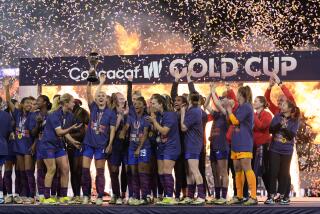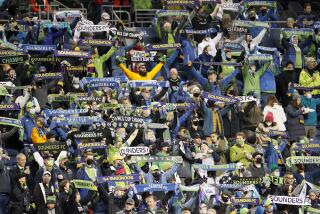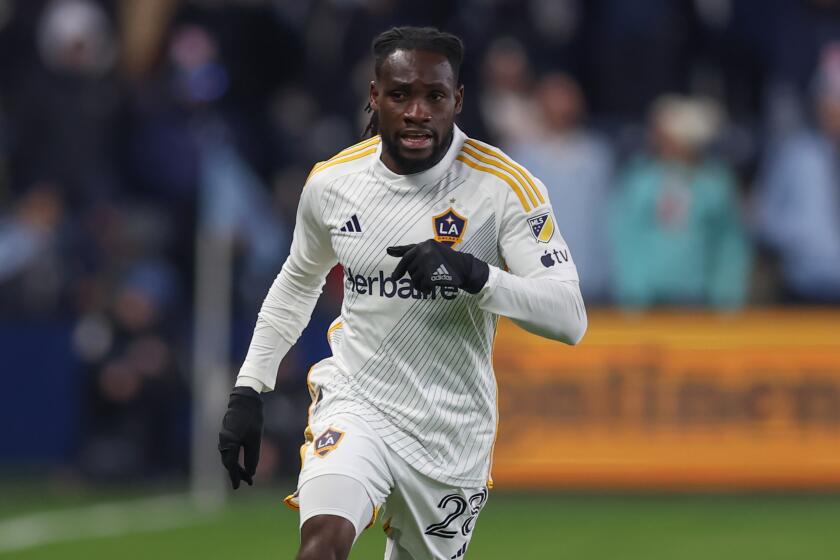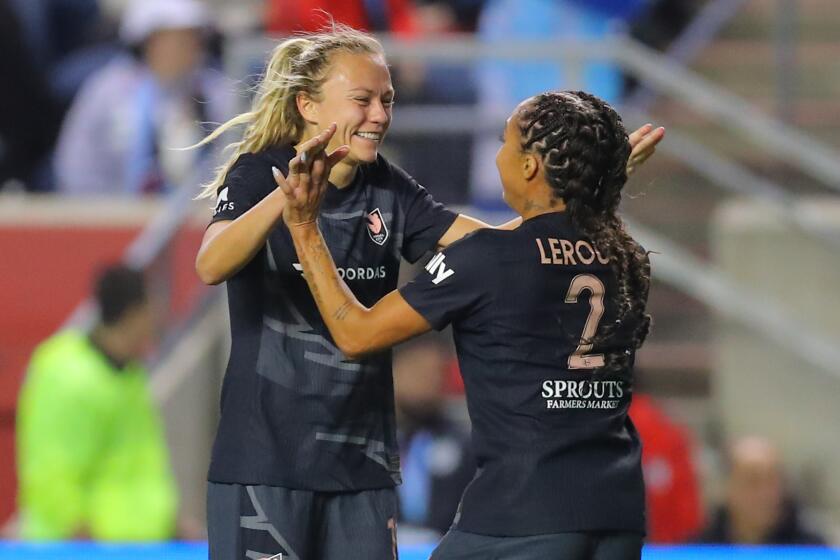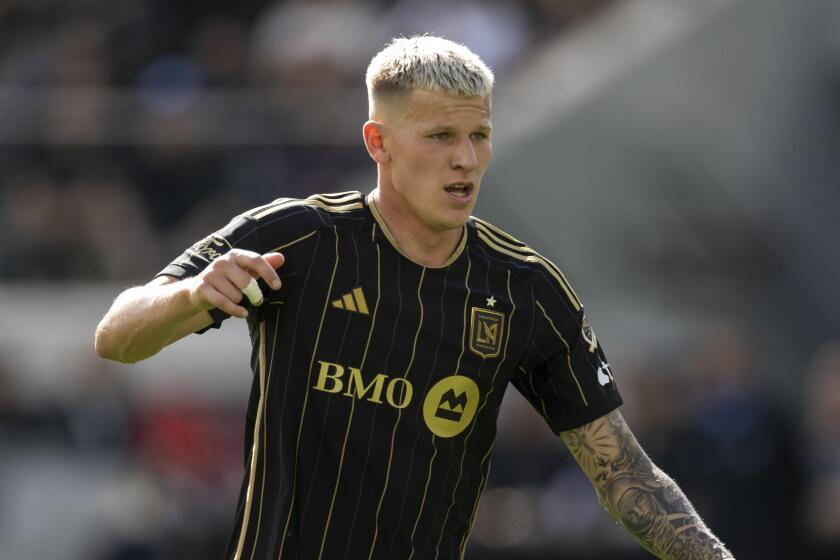Newsletter: Soccer! U.S. will go all out Thursday against Sweden, then things get complicated
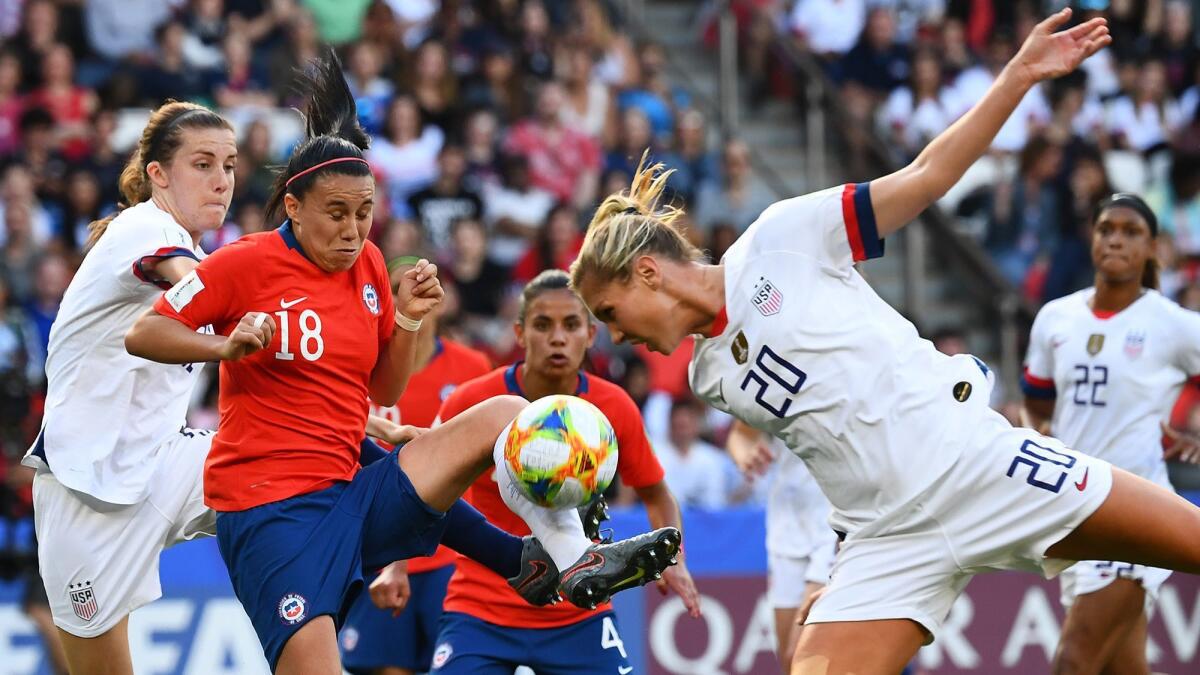
Hello and welcome to the latest edition of the L.A. Times soccer newsletter. I’m Kevin Baxter, the Times’ soccer writer. Today we are just outside Le Havre, a port city on the Normandy coast of France, where the U.S. will complete group play in the Women’s World Cup against Sweden on Thursday.
We’ll get to that in a minute. But first a little about Le Havre, which is the second-largest port in France behind Marseille. Its name, in fact, translates as “the harbor.”
The city and port, which date to 1517, were largely destroyed during World War II — especially during the Normandy invasion, when 5,000 people were killed and 12,000 homes were destroyed. The city center took two decades to rebuild in a modernist style designed by Auguste Perret.
Le Havre also has some local soccer significance since LAFC manager Bob Bradley coached here in 2015-16. His team tied Metz for third place in the Ligue 2 standings that season and matched it on goal differential too, but Metz won promotion to Ligue 1 on the goals-scored tiebreaker.
Bradley isn’t the only famous philosopher to have taught in Le Havre. Existentialist writer and Nobel Prize-winner Jean-Paul Sartre also lectured in the city.
Now back to the soccer.
With a second straight convincing win Sunday — this one by a 3-0 count over Chile — the U.S. has already booked passage to the round of 16 in this Women’s World Cup. That really was never in question, though. The U.S. has lost just one game in Women’s Cup group play, going 19-1-3 in eight tournaments.
How the U.S. advances, however, could go a long way toward determining how the rest of the event unfolds.
Given its superior goal differential, the U.S. will win the group with a win or draw Thursday against Sweden. And the Americans have a score to settle in that game, since Sweden eliminated the U.S. from the 2016 Olympics with a penalty-kick win in the quarterfinals.
It was the team’s earliest exit ever.
But here’s where things get complicated, so pay attention.
If the U.S. advances as the group champion, it would play Spain, a group runner-up, in its first elimination game. And if it wins that, it figures to play high-flying France in the quarterfinals before a sold-out pro-French crowd in Paris.
If the U.S. loses to Sweden and finishes second in the group it would drop to the bottom half of the bracket and play the loser of the Group E final between Canada and the Netherlands. In that case, the earliest they could play France would be either the final or the third-place game.
U.S. coach Jill Ellis, asked over the weekend whether the competing scenarios would affect the way she has her team play against Sweden, dismissed the idea of trying to pick a route through to the final.
“We want to win every game. That’s where we’re at and that’s what we want to do,” she said. “If you get too much into manipulating or planning or overthinking something, I just don’t think that’s a good message.
“Deciding to come second or manipulate a score, that can be dangerous. You need your team to be in a really good place. And feeling good about your performance is the best confidence-maker out there. The draw is what it is and we navigate whoever is in front of us.”
I can’t imagine Ellis suggesting, even for a second, that the U.S. not go all out. And I can’t imagine any of her players following those orders if she gave them.
But when you look at the possibilities, it is interesting — interesting enough that Fox Sports, FIFA and the local organizers in France are undoubtedly watching as well.
Consider Fox first. In 2011 the company paid $425 million for the rights to the 2018 and 2022 men’s World Cups in the U.S., and Telemundo paid $600 million for Spanish-language U.S. rights. FIFA basically threw in the rights to the women’s tournaments.
So what happened? The Americans didn’t qualify for the men’s event in Russia and interest sagged in the U.S. Now Fox faces the possibility of the women falling in the quarterfinals, leaving it with a final four without the American team for the first time in Women’s World Cup history.
You can hear the TV channels changing now.
Fox may have gotten the rights for free but to its credit it has spent tens of millions building an epic set near the Eiffel Tower and broadcasting every game from France.
Telemundo could be in an even bigger jam because Mexico, its main draw, didn’t qualify for France. Losing the U.S. would be a second body blow.
For FIFA, an earlier-than-usual exit for the U.S. would be a double-edged sword. Interest in the tournament would clearly drop in North America, one of its largest and most important markets, but would probably grow in Europe. The U.S. women have become the team the rest of the world has come to hate and if France becomes a giant killer, it would have a huge following the rest of the way.
The same goes for the local organizers in France. U.S. fans, who bought tens of thousands of tickets for the semifinals and final in Lyon, might wind up canceling reservations and staying home — or staying in Paris — if the U.S. isn’t playing in those games.
Any tickets that hit the secondary market would surely be gobbled up by French fans, but hotels and restaurants could suffer.
A lot of people, then, have a stake in how the U.S. does Thursday. And Ellis isn’t listening to them.
“Right now the only team that we’re concerned about is the team that’s right in front of us. And that’s Sweden,” she said. “Beyond that there’s a lot of grass to navigate between now and potential matchups.”
Learning curve
Ellis made seven changes to her lineup between the opening rout of Thailand and the Chile game, then used all three of her substitutions, ensuring that all 20 of her outfield players made an appearance in the first two Women’s World Cup games. She said that’s something she learned from her first world championship as coach four years ago.
That one worked out OK, with the U.S. rolling unbeaten to their third World Cup title. But Ellis felt like she could have better prepared her team for the possibility of suspensions and injuries, which hampered the Americans in the knockout stages in 2015. So this year she went in with a plan to do that.
“It’s kind of been this big picture plan for a few months now,” she said. “What 2015 taught me is the more prepared you are to deal with all those things, the better off you’ll be.”
The U.S., as expected, has been the dominant team in the tournament. But the numbers they’ve put up have still been a little ridiculous when you consider this is the strongest Women’s World Cup field ever.
With 16 goals in two games, the U.S. is just nine shy of the record of 25 in one tournament, held jointly by the U.S. and Germany. And the U.S. hasn’t allowed a goal, either, leaving it on pace to break Norway’s record for best goal differential at +22.
Eight players have contributed goals to the U.S. cause. The U.S. record is 10 goal-scorers in 1991. This team could play as many as five more games in France.
Will U.S. shine in the Gold Cup?
The U.S. opens play in the CONCACAF Gold Cup on Tuesday night in St. Paul, Minn., facing Guyana in a game that is probably more significant — for both sides — than it may appear.
For Guyana, the game is its first in the biennial regional championship — which expanded this year by four teams — marking a huge step for the program.
For the U.S., the game is the first competitive match under new coach Gregg Berhalter. And it comes following a pair of poor efforts in losses to Jamaica and Venezuela.
Berhalter and his players are refusing to panic, though. Many of the coach’s first-choice players sat out the two losses and those who did play are still trying to learn Berhalter’s complicated and demanding style of play.
“Everyone right now outside has their opinions about us and the past couple of games. And that’s perfectly fine,” forward Paul Arriola said. “For us the message stays the same and that’s staying together as a team.
“That’s how you’re going to win. We all believe in each other and ourselves.”
Added former Galaxy defender Omar Gonzalez: “Playing pretty football, playing out of the back, positional play. We’re going to have a certain style.
“There will be growing pains. And it doesn’t matter if we make a mistake and they score on us. We’re going to still stick to how we want to play. We all know that’s part of the game.”
The U.S. is the defending tournament champion and has made it to the semifinals of every edition since 2000. Extending that streak won’t be easy, though, since the Americans have been grouped with Trinidad and Tobago, the team that eliminated them from the 2018 World Cup, and Panama, the team that went to Russia in their place.
Berhalter is also missing two players who are instrumental to his preferred style in center back John Brooks and defender Tyler Adams, whose skill set is uniquely suited to the hybrid right back-midfielder role that is key to the U.S. attack.
“It’s one of those things that you can’t control,” Berhalter said of Adams’ injury.
The three-week tournament ends July 7 in Chicago.
(Watch highlights from the U.S. victory over Chile, here: https://www.foxsports.com/soccer/video/1540825667675?utm_campaign=share_buttons&utm_medium=fscom&utm_term=post&utm_content=return_visit&utm_source=share_url).
You never forget your first
Galaxy midfielder Uriel Antuna has had an eventful debut with the Mexican national team, twice getting cut from the roster only to be reinstated as an injury replacement, then scoring three times and adding an assist in El Tri’s Gold Cup opener with Cuba at the Rose Bowl.
“It was always a dream for me as a small child to play in this tournament,” he said after the 7-0 win. “I made it my objective to be here and now I have the opportunity and thanks to God I am able to take advantage of this opportunity.”
The hat trick gave him more goals in 80 minutes with the national team than he has scored in 16 starts and nearly 1,300 MLS minutes with the Galaxy.
Yet Antuna almost didn’t get the chance. After playing well off the bench in two friendlies, picking up an assist in the first, Mexican coach Tata Martino said Antuna would have made the team if he had 24 roster spots. But he only had 23.
However, with defender Hector Moreno hobbled, Martino asked Antuna to stay in camp just in case. When Moreno was pronounced fit Antuna prepared to pack again, only to be told the team had questions about an injury to Jorge Sanchez.
It wasn’t until 25 hours before the Gold Cup opener, when Mexico formally released its official tournament roster with Antuna’s name on it, that the player could be sure he had made the team. And when Monterrey attacker Rodolfo Pizarro reported to the Rose Bowl with a minor muscle issue, Martino decided to rest him and give Antuna the start.
Sign up for our weekly soccer newsletter »
“I said, ‘I’m going to take advantage of the chances I’m given.’” he told reporters afterward. “I was surprised, but also prepared for any moment.”
Antuna thanked his coach with three goals during the game before giving him a second shout-out afterward.
“I’m very happy with the opportunity that coach Martino is giving me,” he said. “I am very happy I was able to score but the team played a great game.”
That his debut came in Los Angeles made it even more memorable, he said.
“It’s a very special feeling. Ever since I came to Los Angeles the people have treated me very well, the fans have been amazing, and I have felt at home ever since I first came here,” he said.
Martino was less sanguine, suggesting that Antuna should stay off social media and ignore the headlines.
“Look, sincerely, the first thing I’d tell him is: ‘Don’t listen too much. Don’t get on social media too much. Don’t watch too many programs.’” the coach said. “For someone who recently started, it’s nothing more and nothing less than a good night.”
(Watch Antuna’s first national team goal, in the game’s second minute, here: https://depor.com/futbol-internacional/resto-del-mundo/mexico-vs-cuba-vivo-gol-antuna-1-0-jornada-1-copa-oro-2019-california-video-119900).
Here’s the Gold Cup group-play TV schedule and results for Mexico and the U.S. (all times PDT):
Mexico
June 15: Mexico 7, Cuba 0
Wednesday: vs. Canada at Broncos Stadium at Mile High, Denver, FS1, Univision/UDN, 7:30 p.m.
June 23: vs. Martinique at Bank of America Stadium, Charlotte, N.C., FS1, Univision/UDN, 5:30 p.m)
U.S.
Tuesday: vs. Guyana at Allianz Field, St. Paul, Minn., FS1, UniMas/UDN, 7 p.m.
June 22: vs. Trinidad & Tobago at First Energy Stadium, Cleveland, FS1, Univision/UDN, 5 p.m.
June 26: vs. Panama at Children’s Mercy Park, Kansas City, Kan., FS1, UniMas/UDN, 6 p.m.
Galaxy among the MLS big spenders
The MLS players union released salary information on the league’s 691 players last week. And while it’s always wise to look at the figures more as a guide than the truth, there are some interesting takeaways just the same.
Toronto FC is the only club in the league with a teamwide guaranteed compensation of more than $20 million. It will shell out $22.122 million for its roster. The Galaxy is a distant second at $18.515 million.
Chicago is next at $16.9 million followed by LAFC, fourth at $13.162 million.
Team payrolls
Base Salary Total Compensation Spot in Standings
Toronto FC $19.8 million $22.1 million 14
Galaxy $17.7 million $18.5 million 3
Chicago Fire $15.2 million $16.9 million 17
LAFC $11 million $13.1 million 1
Sporting K.C. $12.4 million $13 million 21
Atlanta United $12.1 million $12.7 million 6
Seattle Sounders $11.2 million $12.6 million 7
Montreal Impact $7.6 million $12.1 million 4
Portland Timbers $11.1 million $11.8 million 23
Orlando City $10.5 million $11.3 million 16
Columbus Crew $10.5 million $11.2 million 19
Real Salt Lake $9.9 million $10.8 million 13
D.C. United $10.1 million $10.6 million 5
New York City FC $9.4 million $10.1 million 10
Minnesota United $8.4 million $9.1 million 12
San Jose Earthquakes $8.4 million $9.2 million 15
Philadelphia Union $8.1 million $9 million 2
Colorado Rapids $8 million $8.9 million 22
New England Revolution $8.1 million $8.9 million 20
FC Cincinnati $7.7 million $8.8 million 24
FC Dallas $7.8 million $8.7 million 11
New York Red Bulls $7.7 million $8.3 million 8
Vancouver Whitecaps $7.2 million $8 million 18
Houston Dynamo $7.1 million $7.7 million 9
Many teams are clearly not getting what they’re paying for. Toronto, for example, is 14th in the Supporters’ Shield standings despite being No. 1 in spending. And the Fire is third in spending and 17th in the standings. Philadelphia, on the other hand, has the league’s second-best record but its guaranteed compensation figure of $9 million is higher than just seven other teams.
As for individual paychecks, the Galaxy’s Zlatan Ibrahimovic is the top-paid player in MLS history, making $7.2 million this season. The Galaxy also has the second-highest-paid player in the league, although the team gave Gio dos Santos all his money to go away. Dos Santos’ contract called for a base salary of $4.75 million and total compensation of $6.5 million before he was bought out on the eve of the season opener.
Carlos Vela has the fifth-richest contract in the league at $6.3 million in total compensation. A record 48 others will make at least $1 million in 2019.
Top 10 MLS salaries
Base salary Guaranteed compensation
Zlatan Ibrahimovic (Galaxy) $7.2 million $7.2 million
Giovani dos Santos (Galaxy) $4.75 million $6.5 million
Michael Bradley (Toronto FC) $6 million $6,428,571
Jozy Altidore (Toronto FC) $4,891,250 $6,322,250
Carlos Vela (LAFC) $4.5 million $6.3 million
Bastian Schweinsteiger (Chicago) $5.6 million $5.6 million
Ignacio Piatti (Montreal) $5.3 million $5.6 million
Alejandro Pozuelo (Toronto) $3.8 million $3.8 million
Wayne Rooney (DC United) $3.5 million $3,507,500
Josef Martinez (Atlanta United) $3 million $3,058,333
Salaries are up throughout the league. The average base salary for non-designated players, according to the union, is $345,867, a 13.3% climb over last season and nearly $200,000 more than in 2014.
In addition to Ibrahimovic and the departed Dos Santos, the Galaxy has three other millionaires in midfielders Romain Alessandrini ($1.87 million) and Jonathan dos Santos ($2 million) as well as defender Jorgen Skjelvik ($1.067 million).
New additions Diego Polenta ($777,276) and Giancarlo Gonzalez ($719,583) are the next richest players. The Galaxy is also paying Joao Pedro, who hasn’t played for the team in nearly a year, $261,000 — $11,250 more than it is paying Emil Cuello, Diedie Traore, Servando Carrasco and Efrain Alvarez combined.
With Andre Horta, due to make $1.277 million this season, returned to Portugal last week, Diego Rossi is LAFC’s only other millionaire after Vela. Adama Diomande is close, though, at $935,000.
Rodolfo Zelaya will take home $185,833 this year, more than goalkeeper Tyler Miller ($77,565) and midfielder Latif Blessing ($103,125) combined. Zelaya has yet to appear in a game while Miller is tied for third in the league in shutouts with six and Blessing has made 14 starts.
Walker Zimmerman’s new contract will pay him $600,000.
The union’s collective bargaining agreement with the league ends when the season does and salaries and other work conditions such as free agency will once again be contentious matters in the negotiations. The players are also likely to push for improvements in travel conditions, including the use of more charter flights, when talks begin in earnest this fall.
Currently MLS rules limit teams to four charter slights a season.
Quotebook
“There were a lot of critics talking about us but we’re back. So suck on that one. It’s just outside noise. We don’t listen to the haters.”
-- Australian captain Sam Kerr after the Matildas rallied from a 2-0 halftime deficit to beat Brazil in Women’s World Cup group play.

